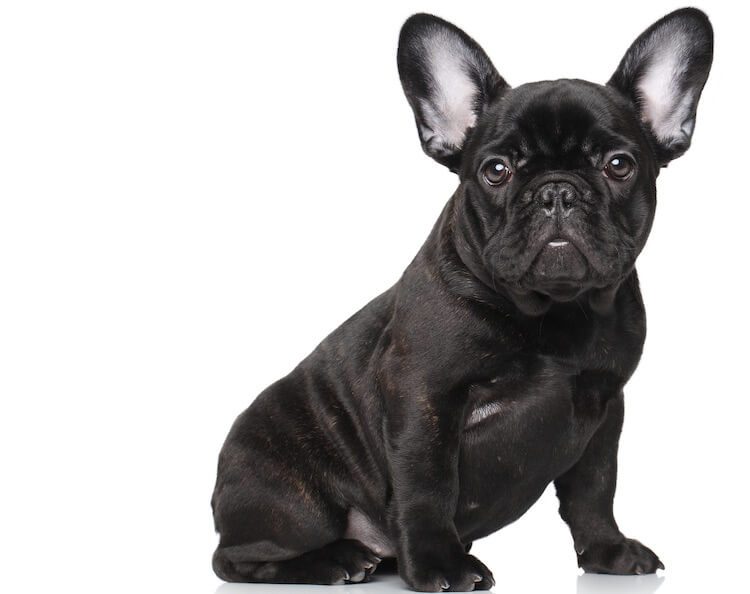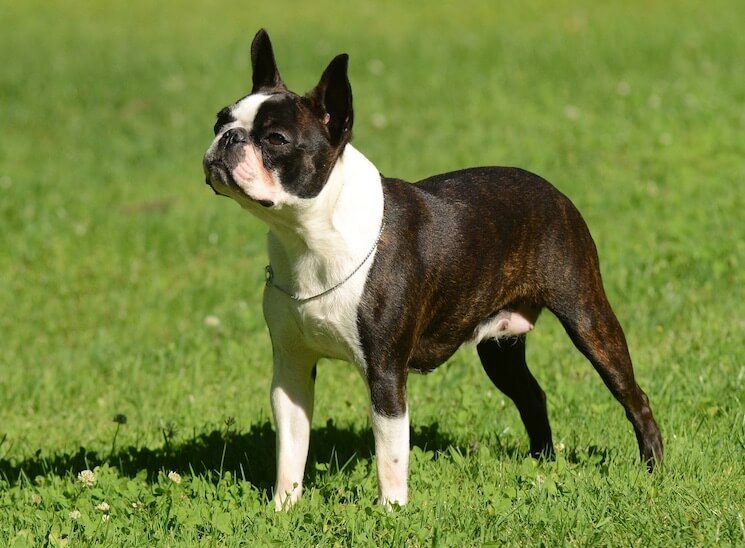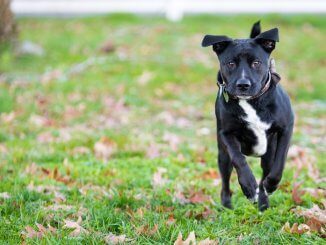The Frenchton is a charming mix of the French Bulldog and Boston Terrier, embodying a delightful combination of both breeds. With a robust physique from the Boston Terrier and the playful spirit of the French Bulldog, these dogs are known for their affable and easygoing character. Their compact size makes them perfect companions for apartment dwellers or those with limited space.
Having grown up around dogs, I’ve always been drawn to the distinct traits each breed offers. The Frenchton, with its expressive eyes and boundless energy, effortlessly captures the hearts of everyone they meet. Their versatility makes them a favored choice among diverse households, adapting easily to various living situations.
Observing Frenchtons in their daily antics is a true pleasure. Whether darting across a park or cozying up on a sofa, they bring a vibrant spirit to any setting. The French Bulldog Boston Terrier Mix combines smarts with warmth, ensuring that life with a Frenchton is filled with joy and laughter.
As someone who studied Animal Behavior & Welfare, I’m here to help you understand Frenhcton better. Read on to learn about its parent breeds, personalities, care needs, and more.
TABLE OF CONTENTS
- Frenchton Quick Breed Summary
- Origins of the Frenchton
- Physical Appearance of the Frenchton
- Temperament of the Frenchton
- How to Take Care of Frenchtons
- How to Train a Boston Terrier French Bulldog Mix
- The Most Common Health Problems Among Frenchtons
- Costs of Owning a Frenchton
- FAQs: More About the Frenchton
- So, Is the Frenchton Right For You?
Frenchton Quick Breed Summary
Origins of the Frenchton
I’ve always been intrigued by the stories behind each breed, and diving into the origins of the Frenchton, with its blend of charm and resilience, truly captivates my interest. It’s a delightful journey into how the lovable characteristics of the French Bulldog and the Boston Terrier were merged to create this popular companion.
The French Bulldog
The French Bulldog, with its distinctive “bat ears” and sturdy, compact build, originated from a smaller breed of English Bulldogs. These dogs were brought to France by lace workers during the Industrial Revolution, where they gained immense popularity in Parisian society. This breed was particularly favored by artists, actors, and writers of the late 19th century, who found their temperaments and unique appearances endearing. The French Bulldog’s charm lies not only in its physical attributes but also in its laid-back and affectionate nature, making it a favored pet in urban settings.
Over the years, the French Bulldog has faced challenges related to its health, primarily due to its brachycephalic (short-faced) features. This has led to issues such as breathing difficulties and overheating. However, their adaptability and loving disposition continue to endear them to dog lovers worldwide, maintaining their status as one of the most popular breeds in urban environments.
The Boston Terrier
The Boston Terrier, known affectionately as the “American Gentleman,” originated in the United States. This breed was developed in the late 19th century through the crossbreeding of English Bulldogs with the now-extinct white English Terriers. The Boston Terrier was one of the first breeds created in the U.S., and it quickly garnered a reputation for its gentle, friendly nature and distinctive tuxedo-like black and white coat, which adds to its gentlemanly appearance.
Boston Terriers are renowned for their intelligence and lively character. They are highly adaptable to different living conditions, making them excellent companions for a variety of households. Their sociable and eager-to-please demeanor makes them great family pets, and they are particularly known for their patience and gentleness with children. The Boston Terrier’s enduring popularity is a testament to its role as a companionable and versatile breed, suited to both city and country living.
The History of the Frenchton
The creation of the Frenchton was driven by a desire to mitigate some of the health issues prevalent in the French Bulldog while maintaining the size and temperament that make both parent breeds so appealing. Emerging in the 1990s, this hybrid was designed to possess a longer snout than the French Bulldog, potentially reducing respiratory issues and improving overall health. The Frenchton combines the playful spirit and robustness of the Boston Terrier with the affectionate, laid-back nature of the French Bulldog.
Frenchtons quickly became popular as they inherited the best traits of both breeds. They are known for their increased stamina and reduced health complications compared to the French Bulldog, along with a friendly, adaptable personality that makes them suitable for a variety of family environments. Their combination of traits from both the French Bulldog and the Boston Terrier has made the Frenchton a beloved companion in many homes around the world.
Physical Appearance of the Frenchton
Exploring the physical appearance of the Frenchton is like uncovering a treasure trove of delightful features that blend the best of two beloved breeds. These little dogs pack a lot of charm into their compact frames, making them standout companions wherever they go.
Height and Weight
Frenchtons typically have a compact, muscular build that strikes a perfect balance between their parent breeds. They usually stand about 14 to 16 inches tall at the shoulder, ideal for both cuddling and playful romps. Weighing in at around 15 to 30 pounds, their size is just right for both city apartments and spacious homes. It’s always a joy to see how well they manage their sturdy yet manageable physique.
Coat and Color
The coat of a Boston Terrier French Bulldog Mix is short, sleek, and very easy to maintain. This breed takes after both the French Bulldog and the Boston Terrier with its smooth, low-shedding coat. This is great for owners who prefer minimal grooming. Color variations include black, brindle, white, cream, and combinations of these, giving each Frenchton a distinct look. I often find that their coats express their unique personalities beautifully.
Other Physical Features
The face of a Frenchton is truly captivating, with large, round eyes and a flattened snout that demands affection. They often inherit the square-shaped head of the Boston Terrier and the iconic bat ears of the French Bulldog. Such a combination creates a look full of character and charm. Their tails usually resemble the short stub typical of the French Bulldog, adding to their quirky appeal.
Temperament of the Frenchton
The Frenchton is not just a joy to look at but also a delight to live with. Their temperament combines the best aspects of the French Bulldog and the Boston Terrier, resulting in a companion that’s both playful and laid-back. Let’s dive into the various facets of their personality.
Playfulness and Energy
Frenchtons are known for their playful nature and moderate energy levels. They love to engage in games and are always up for a quick play session in the park. Despite their zest for life, they are surprisingly well-balanced, never too hyper or too lethargic. This makes them perfect for families or singles alike, as they adapt well to different types of living environments and lifestyles.
I find their playful antics endlessly entertaining. Whether it’s a simple game of fetch or a more involved tug-of-war, Frenchtons bring a joyful enthusiasm to every activity. They have a way of making everyday moments feel a little more special. Their energy is infectious, brightening up even the dullest days.
Affection and Sociability
Frenchtons thrive on human interaction and are incredibly affectionate with their families. They form strong bonds with their owners and often seek out cuddles and pats. Their friendly nature extends to new people and other pets, making them excellent companions for social households or outings.
In my experience, Frenchtons are the epitome of a lap dog with a social butterfly’s spirit. They love being the center of attention and are quick to charm everyone they meet. Their sociable demeanor ensures they are always a hit at gatherings, often serving as the little ambassador of the family.
Adaptability and Intelligence
Frenchtons are remarkably adaptable, adjusting well to various home settings, from spacious houses to cozy apartments. They handle changes in their environment with ease, showing resilience in new situations. This adaptability is complemented by their intelligence, which makes them responsive to training.
Their cleverness comes through in their quick learning of new commands and tricks. Training sessions with Frenchtons are as enjoyable as they are productive. They pick up cues quickly, and their desire to please makes them eager learners. This blend of adaptability and intelligence ensures that they not only fit into a wide range of lifestyles but also enhance them.
How to Take Care of Frenchtons
Owning a French Bulldog Boston Terrier Mix is a joyful journey filled with affection, play, and unique challenges. To ensure they thrive under your care, it’s crucial to understand the specifics of their dietary, grooming, exercise, and mental stimulation needs.
Feeding
- High-Quality Diet: Opt for premium dog foods specifically formulated for small, yet active dogs. The ideal diet for a Frenchton should be rich in protein to support muscle health. Also, they need easily digestible carbohydrates like sweet potatoes or brown rice for energy. Fats are equally important, especially those rich in omega fatty acids. They help maintain a shiny coat and healthy skin.
- Feeding Schedule: Consistency is key when feeding a Frenchton. Provide wo meals a day—morning and evening. It helps prevent hunger pangs and overeating at one go, which can lead to bloating. This schedule also aids in maintaining stable energy levels throughout the day.
- Portion Control and Monitoring: Use a measuring cup to serve their food to ensure you’re giving the correct amount. Adjust depending on your dog’s activity level, age, and weight. Keep an eye on your pet’s body condition. Consult with your vet to determine the necessary dietary adjustments.
- Special Dietary Considerations: Frenchtons can be prone to allergies and sensitivities. It’s crucial to monitor how different foods affect them. Ingredients to watch include common allergens like corn, wheat, and soy. If you notice signs of digestive distress or allergic reactions, such as itching or gastrointestinal upset, consult your vet for a possible diet change.
- Supplements: Depending on their health needs, some Frenchtons might benefit from supplements. For instance, probiotics can aid digestion. Meanwhile, glucosamine can be beneficial for joint health as they age. However, always discuss with your veterinarian before introducing any supplements to your dog’s diet
Grooming
- Regular Brushing: Despite their short hair, Boston Terrier French Bulldog Mixes benefit from regular brushing to minimize shedding and keep their coat shiny. Using a soft bristle brush, give your Frenchton a thorough brush at least once a week. This will help distribute natural skin oils throughout their coat, enhancing its health and sheen.
- Bathing Routine: Frenchtons don’t require frequent baths. But when it’s time, make sure to use a gentle, dog-specific shampoo. Bathing every 4-6 weeks is sufficient unless they get particularly dirty or smelly. Ensure that the water is lukewarm. Thoroughly rinse off all shampoo to prevent skin irritation.
- Skin Care: Due to their folds and wrinkles, especially around the face, Frenchtons can be prone to skin infections if not properly cared for. Post-bath, it’s important to gently dry these areas gently. You can also use a soft, damp cloth to clean their folds several times a week to prevent dirt and bacteria buildup.
- Ear Care: Their wide, open ears make Frenchtons susceptible to ear infections. Regular checks and cleaning are necessary. Use a vet-approved ear cleaner and gently wipe out the visible parts of the ear with a cotton ball—never insert anything into the ear canal.
- Nail Trimming: Frenchtons need their nails trimmed regularly to prevent discomfort while walking and potential health issues. If you can hear their nails clicking on the floor, they’re too long. Nail trimming every 3-4 weeks is typically adequate, but this can vary based on their activity level and the surfaces they walk on.
- Dental Hygiene: Good oral health is vital for a Frenchton. Regular teeth brushing with dog-specific toothpaste can prevent dental problems. Aim to brush their teeth several times a week. Additionally, dental chews and toys can help maintain their dental health by reducing tartar buildup.
Exercise
- Daily Walks: Frenchtons need regular walks to keep fit and burn off their energy. Aim for at least two 15-minute walks a day, one in the morning and one in the evening. This not only helps them maintain a healthy weight but also keeps their joints and muscles in good condition. I find these walks are also a great way for us to bond and for them to satisfy their curiosity about the world around them.
- Playtime: In addition to walks, Frenchtons love interactive play sessions. Games like fetch, tug-of-war, or even hide-and-seek engage their minds and bodies. Keep playtimes short and energetic; about 10 to 15 minutes of focused play can really brighten their day and strengthen your connection.
- Appropriate Toys: Invest in toys that are size-appropriate and safe for Frenchtons. They often enjoy chew toys or small balls that they can chase. Toys that encourage them to think, like treat-dispensing puzzles, are also excellent for keeping them physically and mentally stimulated.
- Avoid Overexertion: Given their brachycephalic nature, it’s crucial to watch for signs of overexertion, especially in hot weather. Ensure they have plenty of water and shade during outdoor activities, and avoid strenuous exercise during the hottest parts of the day. If I notice my Frenchton panting heavily, we take a break and cool down.
How to Train a Boston Terrier French Bulldog Mix
These pups are smart and keen to make you happy, which makes them quite receptive to regular training. Their sharp minds and desire to please create a smooth and enjoyable training experience for both of us.
Establishing a Routine
Consistency is key when training your Frenchton. Establish a clear routine that includes specific times for training, meals, and bathroom breaks. This structure helps them understand expectations and creates a sense of security. I always start with basic commands like ‘sit’, ‘stay’, and ‘come’, which not only introduces them to training but also instills essential obedience skills.
Incorporate training sessions at the same time each day to build a habitual learning environment. These sessions should be short, around 10 to 15 minutes, to maintain their attention and keep them engaged without overloading their focus.
Positive Reinforcement Techniques
Frenchtons respond exceptionally well to positive reinforcement. This means rewarding good behavior with treats, praise, or playtime, which encourages them to repeat those behaviors. Always keep some small treats handy during training sessions for immediate rewards.
Avoid harsh corrections or negative reinforcement, as these can lead to fear and stubbornness. Instead, focus on rewarding what they do right. If a mistake happens, simply redirect them to the correct action and reward them for following through. This approach not only promotes learning but also strengthens the bond between you and your dog.
Socialization and Handling
Early socialization is crucial for your Frenchton. Expose them to different people, animals, environments, and sounds. This exposure helps prevent fearfulness and aggression as they grow. Regular visits to dog parks or pet-friendly areas are great for this, as well as inviting visitors to your home to meet them.
Handling is also an important aspect of training. Get your Boston Terrier French Bulldog Mix used to being touched and examined, especially around the ears, paws, and mouth. This will make grooming, veterinary check-ups, and daily handling much easier. I often practice gentle handling during calm moments to get them comfortable with physical contact.
Advanced Training and Challenges
Once your Frenchton masters basic commands, you can move on to more challenging tasks. Teach them tricks like ‘roll over’ or ‘shake’, or engage them in agility training to keep their minds and bodies active. These activities provide mental stimulation and physical exercise, which are vital for such an intelligent and energetic breed.
Training a Frenchton is not just about teaching them commands but also about engaging with them and making the learning process fun and rewarding. With patience and consistent positive reinforcement, you will find that training your Boston Terrier French Bulldog mix is a fulfilling adventure that enhances your relationship and ensures their well-being and happiness.
The Most Common Health Problems Among Frenchtons
Frenchtons, like all breeds, have their share of health concerns. Understanding these can help you provide the best care for your pet. Here are some of the most common health issues they face:
Respiratory Issues
Frenchtons can suffer from brachycephalic airway obstructive syndrome due to their short snouts, leading to breathing difficulties. Symptoms include noisy breathing, snoring, and difficulty during exercise.
- Keep them cool and calm: Avoid strenuous exercise and keep them in air-conditioned environments during hot weather.
- Manage their weight: Obesity can exacerbate breathing problems.
- Regular veterinary check-ups: Monitoring their respiratory health can prevent complications.
Skin Allergies
Skin allergies in Frenchtons are common and can cause itching, redness, and hair loss. These allergies are often triggered by environmental allergens like pollen, dust, or diet.
- Regular bathing and grooming: Use hypoallergenic shampoos and keep their coat clean.
- Dietary management: Consult with a vet to identify and eliminate potential food allergens.
- Allergy treatments: Your vet may recommend medications or supplements to help control allergic reactions.
Joint Issues
Due to their compact build, Frenchtons are prone to joint issues such as patellar luxation and hip dysplasia. Symptoms include limping, reluctance to jump or climb stairs, and pain.
- Maintain an appropriate weight: Excess weight puts additional stress on joints.
- Regular, moderate exercise: Keeps joints flexible without overexertion.
- Supplements: Consider supplements like glucosamine and chondroitin under vet advice.
Dental Problems
Frenchtons often face dental issues, including periodontal disease, due to their tight jaw spacing. Symptoms include bad breath, tooth loss, and gum disease.
- Regular dental check-ups: Professional cleanings can prevent severe dental diseases.
- Daily brushing: Use a dog-specific toothbrush and toothpaste.
- Chew toys: Help clean teeth naturally and keep gums healthy.
Eye Conditions
Frenchtons may experience eye conditions such as cherry eye, dry eye, or corneal ulcers. Symptoms include redness, tearing, or rubbing of the eyes.
- Regular eye exams: Early detection is crucial for treatment and management.
- Keep face wrinkles clean and dry: Prevents bacterial growth that can affect the eyes.
- Protect their eyes: Avoid environments where debris can easily get into their eyes.
Costs of Owning a Frenchton
Bringing a Frenchton into your life is a joyful and exciting event, but it’s important to be prepared for the financial commitment it entails. Understanding the costs associated with owning this breed can help you plan and ensure a happy, healthy life for your new companion. Let’s break down the typical expenses you can expect.
Initial Costs
The initial purchase price of a Frenchton can vary significantly based on factors like pedigree, breeder reputation, and geographical location. Typically, you might spend anywhere from $500 to $3,500 to bring one of these delightful pups home. It’s essential to choose a reputable breeder, as this often ensures the health and well-being of the puppy.
Beyond the purchase, initial veterinary visits for vaccinations, microchipping, and spaying or neutering should also be considered. You’ll also need to invest in essential supplies, such as a crate, bedding, food and water bowls, a collar, and a leash. These initial setup costs can add up quickly, often ranging from $200 to $500.
Ongoing Costs
Day-to-day expenses include high-quality dog food, which can cost around $30 to $70 per month depending on the brand and your dog’s size. Regular vet check-ups and annual vaccinations are critical and can average $100 to $300 yearly, not including unexpected health issues or emergencies.
Don’t forget about grooming; even though Frenchtons have low grooming needs, professional grooming sessions a few times a year can add up to $50 to $100 per visit. Additionally, you might want to consider costs for flea, tick, and heartworm preventatives, which are essential for your dog’s health.
Training and Miscellaneous Expenses
Training classes are highly recommended, especially for first-time owners, to help your Frenchton become a well-behaved family member. Group training classes can range from $50 to $125 for a series of sessions, whereas private lessons can be significantly more expensive.
Other miscellaneous costs can include doggy daycare, pet sitters, or boarding facilities if you travel frequently. Prices for these services vary widely but can be substantial over the course of a year. Also, consider the cost of toys and treats, which are important for your dog’s mental stimulation and overall happiness.
Long-Term Health Care
Frenchtons, like all breeds, have specific health concerns, including issues related to their brachycephalic nature, such as respiratory problems. Planning for potential health issues with pet insurance or a dedicated savings account is wise. Pet insurance premiums can vary, but they typically range from $30 to $50 per month and can be a lifesaver in managing unforeseen medical expenses.
Understanding these costs helps in making an informed decision about bringing a Frenchton into your life. It’s not just about the financial investment but also the commitment to provide a loving, stable home for these wonderful companions.
FAQs: More About the Frenchton
What is the lifespan of a Frenchton?
Frenchtons typically enjoy a lifespan of about 12 to 15 years. This duration can vary based on their overall health, lifestyle, and the quality of care they receive throughout their life. Regular veterinary check-ups, a nutritious diet, and consistent exercise can contribute significantly to reaching their upper lifespan potential.
Are Frenchtons good with kids?
Absolutely, Frenchtons are known for being friendly and gentle, making them excellent companions for children. They are playful enough to keep up with active kids, yet gentle enough to be safe around them. As with any breed, it’s important to supervise interactions between younger children and your Frenchton to ensure they both understand how to appropriately interact with each other.
How do Frenchtons do in homes with multiple pets?
Frenchtons generally get along well with other pets, especially if they have been socialized from a young age. They are social creatures who often enjoy the company of other dogs and can even coexist peacefully with cats. Proper introductions are key to helping them adjust and become comfortable with other family pets.
What is the barking tendency of Frenchtons?
Frenchtons do not tend to be excessive barkers. They might alert you with a bark if there’s a visitor at the door or if they hear something unusual, but they are generally not noisy. This makes them suitable for apartment living or any home where excessive noise would be a concern.
What about the shedding tendency of Frenchtons?
Frenchtons have a low to moderate shedding tendency due to their short coat. Regular brushing, about once a week, can help manage and reduce the amount of hair they lose. Their minimal shedding makes them a comparatively easier option for those who might be concerned about fur buildup in the home.
So, Is the Frenchton Right For You?
The Frenchton, a charming blend of the French Bulldog and Boston Terrier, offers a delightful mix of characteristics that appeal to many pet owners. These dogs are affectionate, playful, and adaptable to various lifestyles, making them popular among families, singles, and seniors alike. Before you decide to welcome a Frenchton into your home, it’s important to understand both the positive traits and the challenges that come with owning this breed.
Frenchtons Are For
- Families with Children: Frenchtons are known for their gentle and playful nature, making them great companions for kids.
- Apartment Dwellers: Their small size and moderate energy levels make them well-suited for apartment living.
- Homebodies: These dogs love companionship and do well in homes where someone is frequently present.
- First-time Dog Owners: Frenchtons are relatively easy to train and manage, making them a good choice for novice owners.
- Those Who Prefer Minimal Shedding: With their short coat, Frenchtons don’t shed very much, which is beneficial for keeping a cleaner home.
Frenchtons Are NOT For
Frenchtons might not be the best fit for everyone. Here are some situations where a Frenchton might not be the ideal pet:
- Active, Outdoor Enthusiasts: Due to their brachycephalic nature, Frenchtons can have difficulty with intense physical activities and are prone to overheating.
- Frequent Travelers or Long-hour Workers: Frenchtons require a lot of companionship and can suffer from separation anxiety if left alone too much.
- Those Unprepared for Health Issues: Owning a Frenchton can come with a higher propensity for certain health problems, which can lead to higher veterinary bills and more care requirements.









Very useful article to a new Frenchton owner.
My Frenchton is a year old and he is amazing! No health issues….very loveable…loves to play outside…loves kids…just an all-around great breed!
Hi Tara, I just got a Frenchton a week ago. She has a lot of breathing problems and the veterinarian said she has Stenotic Nares. The breeder said she would most likely grow out of it, but the vet said she’s going to need surgery in a few months. Can you give me some advice on Frenchton puppies? Also can you tell me a good dog food that you recommend?
Do you recommend your breeder?
I have had my Frenchton since she was 8 weeks old. She is now almost 6 years old and she is an absolute joy. I usually take her in the car with me because she gets lonely if left at home even for a short period. She climbs right up in the car, sits in the back seat and sits up like a little lady. She sleeps under the covers with me every night and will let me sleep until 10:30 am. We go outside twice a day and play ball. She tells me when she wants to go out and it is usually noon and 4 pm. Every time I tell her I love her, she comes and kisses me. She is very attached and she is a wonderful little best friend.
Our frenchton has become a very aggressive dog and is having trouble getting along with other females. Is there anything that can be done?
Hi Mike,
We could do with some further information to establish what has triggered this change in behavior? What is your dog’s history? How old is she? When you say aggressive, what behavior is she displaying? Do you have other females in the home or is this when you take her for walks? There is always a reason behind all behavior. Has she had a bad experience with another dog? Has something recently changed in her life? Have you had a checkup with the veterinarian to rule out any health issue that is causing her to behave in this way? There are plenty of strategies we can look at to help your dog, so please feel free to give some further information.
I have a question I have a breeder who has frenchton puppies to sell. I called her and she told that the mother has just died. She didn’t know why I had so my questions. Do you think it’s a good idea to still buy a puppy from her?
Hi Fernando,
It is certainly a concern that the Mother has died and the breeder isn’t forthcoming with the reason why. I would also be concerned about how the puppies are now being fed and cared for? Those puppies will be missing vital stages in their development without their Mother.
It’s really easy to get stuck thinking that you need to save the puppy from that environment so you buy it anyway. But without any more information it’s difficult to know the circumstance. If they were a reputable breeder, and the Mother had a genuine cause of death, surely they would say so? If not, are they a less than desirable breeder? If so, do you want to keep fuelling the demand for their puppies? It’s not an easy call to make, but I think you already know the answer.
My name is Ramona and I have a Frenchton from a local breeder in Florida. I got Rusty when he was 8 weeks old and now he is almost 2 years old. I decided to get a Frenchton, but unfortunately he is the total opposite of what I expected. He is much heavier and weighs over 30lb. I checked with my vet and he is definitely not overweight… you can feel and see his ribs.
He loves the heat in Florida, his energy level is very high, I have to walk him at least one hour a day and play with him a lot. He had a really strong attitude from the beginning.
My husband and I love him and with us he is a little angel. He likes to learn and he listens. He sleeps from 10 pm till 8 am without any interruptions. I think every dog has his own character and you cannot rely on what is typical for a breed. I thought a Frenchton would be perfect for me because of the low energy leve…but that’s all not true for Rusty.
Hi there. I currently live in Orlando, Florida and noticed you got your Frenchton from a breeder in FL. Can you send me an email with more information? I want to ensure, we buy our baby from a trusted breeder.
Please send me the information regarding the breeder
Thank you
So much
I’m looking at getting a Frenchton, but the puppies are not a typical 50/50 mix. The breeder has a male Boston Terrier being bred with a French Bulldog/Boston Terrier mix… Also, this is the only “Frenchton” breeder in my area that I’m aware of (we live in quite a rural area).
The breeder doesn’t do any type health screening (only vaccinations), but is asking between $800-$1000 for her male puppies, and $200 more for females. I don’t know enough about the genetic makeup of these dogs to know how important it is to get the health screening before you purchase?
Any reputable breeder will offer health screening. Good breeders only do so to further the health of a breed. If they aren’t health screening, they have no idea what they are breeding from. Have you asked the breeder why they don’t carry out any screening? Tests carried out for the French Bulldog will include any of the following:
• Degenerative Myelopathy (DM).
• Juvenile Hereditary Cataracts (HC/HSF4).
• Canine Multifocal Retinopathy 1 (CMR1).
• Hyperuricosuria (HUU)
• Progressive Retinal Atrophy (PRA-PRCD)
• Progressive Retinal Atrophy (PRA-CORD1)
• Congenital Hypothyroidism (TPO)
Tests carried out for the Boston Terrier will include any of these:
• Hereditary Cataracts (HC-HSF4)
• Degenerative Myelopathy (DM)
What price did you guys purchase yours for? Is there a price I should be weary of by chance? I am looking to stay under 1k.
I have 2 male frenchtons, they are biological brothers but born 2 litters apart from the most amazing breeder who is still a godsend to this day. My eldest is 3 years and his brother is 10 months old. They are like chalk and cheese…… honestly you would not think they were the same breed let alone be genetically related!! Eldest is 12.5kg (27-28lbs) and has a big thickset chest and a bracy flat Frenchie face (imagine shrinking a boxer), then we have the aptly named LOKI who is barrel bodied longer type muzzle also weighs in at around 28lbs at 10 months old!!! Loki has (like me) got ADHD and is immensely stubborn but unbelievably loving and playful. Milo on the other hand is the most placid chilled out laid back guy in the world. Milo is also kind of my own superhero too as without any training whatsoever he learnt to recognise when I am about to have a seizure and if I’m alone he alerts my wife by chuffing at her until she follows him to me! Love my boys because they are both frenchtons but both complete opposite of eachother
We got our Frenchton from a rescue. He was 8 weeks old and extremely aggressive towards us and our other dogs (who are bigger but were terrified of him). He would snarl and bite and draw blood. He was purchased from a breeder, way too early obviously. The woman paid $1600 for him and said she couldn’t handle him. Then the foster Mom was going to keep him but decided against it. She said he was just a snuggly little guy and we got him for $400 from the rescue. He had been in 3 homes in 2 weeks before coming to us. It is taking some work but he is SO much better now, 3 weeks into having our new family member. He just didn’t know how to be a puppy, didn’t learn manners from his Mom because he was taken too soon. So to the person who’s Frenchton is aggressive, don’t give up! We squirt him with a water bottle when he starts getting too aggressive and now all I have to do is hold the bottle and he settles right down, then he gets a piece of kibble for making the right choice. They are super smart!